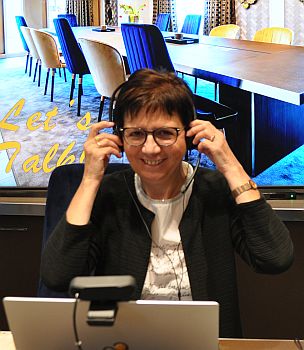Editorial
Dear Insiders,
This Sunday is St. Nicholas Day; the day when children in Germany expect to receive chocolate in their shoes. But not in day nurseries. This year, Santa will not be allowed to visit. At least not from outside. His role is to be played by the teaching assistant ... At least this is the practical suggestion from Bavaria’s Minister of Family Affairs. The children will certainly have their laughs.
The British entertainer Underbelly is innovative. He offers Santa visits by Zoom. On 23 and 24 December, a maximum of six children can talk to Santa Claus for 12 minutes. The elves send the recording afterwards. The experience costs GBP 42 or EUR 46. For an 8-hour working day, that’s GBP 1,680 or EUR 1,860. Holy Christmas!
I have another idea: What if... all over the EU, restaurateurs and hoteliers will reopen their restaurants and hotel rooms on 17 January 2021? This is the plan Dutch restaurateurs have set themselves. "We have nothing to lose," they complain in frustration and make a clear demand from government: If you want 100% closure, then you provide 100% help!
Sarah Douag today describes the industry’s misery and the political chaos in Benelux. We also provide you with an update on the situation in France and Switzerland, as well as the icy tug-of-war around skiing in Austria, Germany, Italy and Switzerland. The Swiss also stand strong: They quite simply refuse to allow any interference from other countries in their winter sports, which they want to maintain.
The industry is falling noticeably into depression: The November state aids promised in Germany may not be made until January. Until then, many more businesses will be bankrupt. The latest survey from Hotelleriesuisse shows: The number of those who are exposed to an ever-increasing risk of insolvency is increasing significantly.
The Christmas drama has begun for business. Hopefully the first, positive decision from Germany’s Constitutional Court will be delivered in time for under the Christmas tree.
Our corona reports summarise the developments, as they do every week. But today we also have articles with a different focus: Adagio CEO Karim Malak brings us news and current developments from the Aparthotel Group, owned by Accor and Pierre & Vacances. Accor itself has announced a new website and section for exclusive villas, just as its upscale and luxury brands will in future carry the addition "Living". Certainly, more and more chains are jumping on the Serviced Apartment and Living waggon; the various examples we bring you today already indicate where the next price war may take place.
A study points the way to the MICE World 2021 and our "Digi News" describe, among other things, robotaxis and self-cleaning door handles. Choice appoints a CEO for Europe - a first. An investment firm wants to promote innovative operators, good. And hoteliers on the Canary Islands are making their empty rooms available to migrants. Others in the industry want to stop this; they fear for the sector’s reputation.
For the hotel and tourism industry this year, it won't be a time of tranquillity, peace and goodwill over Christmas. Just screams from the silence.
Yours, Maria Pütz-Willems
Editor-in-chief
Your opinion? maria[at]hospitalityInside.com
Dear Insiders,
Now that a number of European countries have announced precisely what experiments they'll be conducting with their respective populations over the Christmas and winter period - though they call it "strategy" - we have asked large hotel groups and consortia in Germany if they plan on opening their hotels at all or will keep them open into the New Year. Of course, there is no one uniform line. "A nice gift" it certainly isn't.
Our correspondents made enquiries in France, Italy, Spain, Austria and Switzerland: The misery is fairly evenly distributed. Hoteliers and restaurateurs are pressed up against the wall everywhere. Restaurants have been forced to close almost everywhere, just like the ski resorts in the Alps. Hotels that stay open will make no money. Those looking to close will first calculate what's likely to be more: your own revenue or the promised state aid - if it ever arrives. Almost every survey ends with the finding that the money has not yet arrived and the insolvencies are consequently building up.
There is no strategy, only wild restrictions and threats: If, for example, a Bavarian decides to make a day trip and crosses the border into Austria for one day, he has to quarantine for 10 days on his return. How do they expect to check that in any reasonable way? The heads of Germany’s federal states want to keep the people in lockdown and tighten restrictions further.
The head of the Chancellor's Office, Helge Braun, even said yesterday that the lockdown could last until March... By then the first positive responses from vaccination could be seen. In Berlin, this is hardly spoken out aloud; banking on such hopes would be an admission of their own inability to manage the crisis.
At the moment, you would need a crystal ball for many things - e.g. for a forecast 2021. Analytical companies, IT professionals and revenue management experts say it works: with a focus on the essentials and in a team of man & machine.
And what worked in China should also work in Europe. Christoph Mares, COO of Mandarin Oriental Hotels, is convinced of this. He explains how the luxury hotel group has so far fought against the pandemic - among other things with a lot of creativity and flexibility. The two topics today show ways forward, give some courage.
In the constitutional state of Germany, which politicians themselves like to refer to time and again, only the third force in the state can now lift the spirits. The first seven German hoteliers have filed a complaint with the Federal Constitutional Court: They hope to have their basic right to the free exercise of their profession confirmed.
People have had enough of this government harassment, with all due respect to those who have fallen ill. The response has been anything but proportionate. And who can you now trust?
Society is changing and so is economic life. Employees are encouraged to work more from home, yet more of the 'virtual' is hardly possible. This week the ITB presented its 2021 programme: four days of constant fire on screen!
By contrast, Accor has now transferred all its loose lifestyle brands into a structured lifestyle division within the group - and from the trend city London will probably think about how to communicate this "lifestyle" to an even larger audience - virtually or in real life? In a year's time, I'll ask how many of you accidentally tipped their cocktail into the screen...
In the permanent lockdown, worlds begin to blur. With VR goggles strapped on my face I can escape any depression before it arrives by slipping off every 10 minutes to a new dream destination, visiting my Irish Pub or my Italian restaurant... From my couch, I'll embrace the whole world and kiss my many bonus points from the display of my mutated corona app. If I participate well-behaved and have collected enough social points, I will soon be allowed to travel again.
Yours, Maria Pütz-Willems
Editor-in-chief
Your opinion? maria[at]hospitalityInside.com
Dear Insiders,
The German governing coalition could lose a lot of voters in 2021. By law, they can now ban overnight stays, among other things, in times of a pandemic times - just like that. Hoteliers are now set to take the fight to the Federal Constitutional Court. This discriminatory amendment to the Infection Protection Act, rammed through the German parliament this Wednesday, becomes a test of parliamentary democracy.
In Leipzig, 20,000 people from the Querdenker movement were permitted to exercise their freedom of assembly quite freely without the police intervening to put an end to what could be a mass spreader event. There, it seems, constitutional rights retain some force. Yet when it comes to the freedom of professional hoteliers to carry out their chosen occupation, even meticulous compliance with the rules won't save them. It's the third time now that they are or will be hindered in the exercise of their profession. There's also no discussion of financial compensation.
The industry must also learn to defend itself - early, massively, consistently and with a powerful voice. So far, it has only poured its tears regarding this scandalous and historic decision into social media, but has otherwise remained silent. It can't go on like this.
Jörg Frehse, Managing Director of MHP Hotels from Munich, operator of four Le Méridien Hotels in top city locations, has just rescinded the contract for Frankfurt. The discussion was on the lease and on prospects. The interview with Frehse shows the dilemma that operators are currently facing, even if they manage to pull out all the right stops on revenue... Is 50% occupancy enough to survive as a city hotel? No, the hotelier says clearly. But he's not giving up either.
Frehse is not falling for the lukewarm promises made by the Minister of Justice this week. She wants to create a statutory basis for rent reductions. But the lawyers at GvW, who have poured the case law for us, are dismissive: The recent positive ruling from the Regional Court in Munich is an outlier.
As in Europe, in the US too, hoteliers are hanging on government for support. Sarah Douag summarised the reactions following the 3 November election: The CEOs of the mega-chains and the associations are also calling for unity, for a real Covid-19 plan, stimulus for the economy, emergency aid and warn of mass unemployment. 100.000 restaurants have already closed in the US.
In his summary, Macy Marvel explains how Europe and China have so far come through the pandemic. Despite all the gloom, the EVHC Sentiment Report for Germany has some glimmers of hope, just as the Serviced Apartment segment - in both the UK and Germany - continues to defy the virus. Preferred Hotels launched a new sustainable brand, Beyond Green.
We must also not lose sight of the rather inconspicuous operators on the market and brand changes, which are now beginning to accumulate. A number of things here raise questions; read our research on Dorint, Brendal and Star Inn Hotels.
So it's into the next eventful week; a week in which we should all do our part for the benefit of the industry.
Yours, Maria Pütz-Willems
Editor-in-chief
Your opinion? maria[at]hospitalityInside.com
Dear Insiders,
Let's start with the most positive news this week: There is a vaccination on the horizon. This gives hope, it is a little light at the end of a long and dark tunnel. The governments, however, are still caught up in the darkness when it comes to Germany, Austria or other countries. They prefer to inject their people with money instead of using their intellect. Today's governments are not really interested in the consequences of their monetary mass injections. Next time, they will not be elected again – or maybe only by a slim margin. Just like in the US.
The harsh and dishonourable election campaign in the US shows clearly how important it is to hang on to democratic pillars and to follow constitutional rights… My interview last Friday with Prof. Stephan Gerhard about basic rights in Germany could not have been more appropriate. I received many motivating comments on this, and our LinkedIn post was shared several times as well. Thank you very much for your moral support!
Therefore, it is all the more painful that the German government wants to prohibit the hotel industry and gastronomy from exercising their profession in an almost dictatorial way these days. The planned "adaptation" of the Infection Protection Act provides for the prohibition of all kinds of travels. This calls for action at the Federal Constitutional Court. Or at least for a letter to the Federal President.
Dorint Hotels' Chairman of the Advisory Board, Dirk Iserlohe addressed to the German President yesterday asking him to review the violation of basic rights with respect to the hotel industry. He asked Frank Walter Steinmeier to exercise the substantive right of examination to which the Federal President is exclusively entitled in evidence cases. It will now be interesting to see whether the tireless fighter for the industry will be heard.
The most positive aspects of this edition: The luxury hotel industry slowly understands that the business can evolve only around people in the future as well as new and old values – and everything 24/7. Today, Sylvie Konzack has pushed the "Reset of values". The meaning of this and how the segment copes with the crisis will be presented to you step by step in the course of the next few weeks in interviews with top executives from luxury hotel groups.
The most frustrating thing in this edition: Nearly everything is about corona – again. Fred Fettner summarised the capital injections of the Austrian government under the title "Overstretched and overburdened". In addition, we address the November Aids in several news items as well as the increasing confusion in the entire industry.
More pleasant: The investors' demand concerning properties and concepts for temporary living remain quite stable. Amongst others, Union Investment co-initiated this study.
And Union Investment cooperated with us at the hospitalityInside Investment BAROMETER for the 8th time this fall. The surveyed people still give the asset class hotel a chance, as long as it is able to present a diversified portfolio, creditworthiness and agreements with Upside/Downside character. You will find the summary on our page 1; our subscribers will find more information in the magazine.
Hang in! Until next Friday,
Yours, Maria Pütz-Willems
Editor-in-chief
Your opinion? maria[at]hospitalityInside.com
Dear Insiders,
The second lockdown in Germany is only five days in, but the Bundestag is already busy with its next assault on the industry: It plans to amend the German Infection Protection Act so that in future a pandemic will no longer mean only being able to ban tourist travel, but ALL types of travel. "It would be unprecedented in terms of the one-sided discrediting of the industry," Prof Stephan Gerhard stated in our interview today; an interview that quickly became intensely political and very critical of decision-makers.
Is Germany’s constitutional order, once based clearly on the rule of law, gradually slipping into a state in which basic rights and fundamental freedoms can be suspended without parliamentary scrutiny? We all have the right to question this. If public health is more important than our basic constitutional rights of freedom of occupation, freedom of movement and freedom of assembly, then it's time to demand our basic rights again.
"The constitutional right to life and physical integrity is currently paramount. Don't we need to step back and weigh this better against our other rights?" Gerhard also asks. "We need to have a new national debate on the issue".
In fact: I call on all of you to take part in it, give your opinion! Share this interview with your colleagues, friends and business partners. We have taken the conscious decision today not place this interview behind our paywall and instead make it freely available on our page 1.
Let us have this discussion at the political level - at a level that shows politicians their limitations and makes them question their electability. It is time to act and to change priorities: Only healthy companies can guarantee a healthy economy and a healthy society.
Almost the whole of Europe is shutting itself up at home. Alarming figures from Italy point to nothing short of sheer catastrophe for the hotel industry. My colleague Massimiliano Sarti described the situation there yesterday afternoon.
Soberly and cautiously, Hyatt too is edging forward through the crisis and through Europe. The focus shifted thanks to corona, Felicity Black-Roberts explains today, VP Development Europe. A small highlight is nevertheless in sight: On Tuesday, the first hotel of the Unbound Collection brand in Europe opens in Düsseldorf.
Of course, our reports this week once again deal with the current changes in politics and in the law courts, with the devastating 3rd quarter balance sheet results from the chains, and with the afflicted but still hopeful conference segment. And David Etmenan, CEO of Novum Hospitality Group, denies the rumours: Novum is not for sale and there are no talks! He took the time to say a few more sentences here.
Today at midnight our Investment BAROMETER survey ends. The last chance to participate: Here you go!
Yours, Maria Pütz-Willems
Editor-in-chief
Your opinion? maria[at]hospitalityInside.com
Dear Insiders,
"We will die in best health." This sentence was contained in a LinkedIn post recently. Germany will do its bit in making that happen: The second national lockdown is intended to protect the health system and risk groups. Those who are still healthy will work themselves to death for it. Or be declared dead by way of insolvency. From January, tourism will be crucified. There is anger and incomprehension in the hotel and catering industry - which is set to take legal action against the disproportionate measures. Hopefully. In Germany, only the courts can help. Politicians have been carried off by hysteria.
Hotels and conscientious restaurants have proven over recent months that they have not contributed to the spread. Recklessness in clubs and private parties have formed the hotspots. And so now to crush what’s left of business after the imposition of mandatory early closing time is quite simply irresponsible. When people are assailed by rules that change on a weekly, daily or even hourly basis and are now even prohibited from coming together for a beer or a pizza, what alternative do they have other than to come together in private?
The Minister President of Bavaria, Markus Söder, has a solution for this as well. Since yesterday, the "King of Bavaria" has been threatening to declare a state of emergency and called on his fellow Bavarians to denounce their naughty neighbours. Spiegel.de reported yesterday in the early afternoon: "Bavaria relies on tip-offs from neighbours to penalise violations of contact restrictions at home."
In the evening, the same article read differently: " 'The police should enforce the ban on large meetings in homes in the same way as they combat disturbances of the peace, Söder said. 'Then the neighbours can give the appropriate information and then the police will come.' The police will first ask the people concerned to behave differently. Later, the state chancellery said that this should not be taken as a call for denunciation."
The real catastrophe are the politicians who have shown themselves keen to coerce and unable to communicate. Equally helpless associations, who left it to this Wednesday to shout breathlessly into megaphones at a demonstration in Berlin are still unable to make clear the difference between the hotel and the restaurant to politicians, a whole 8 months into the crisis.
Austria also fears a second lockdown, while in Switzerland the Federal Council this week imposed further restrictions - indefinitely - and in so doing limited demand to such an extreme extent that the industry has been totally paralysed. Everywhere you look, insolvency is just around the corner with destruction of infrastructure and unemployment imminent. In such chaos, any small ray of hope that an independent thinking virologist has been able to give is likely to be lost.
The German virologist Alexander S. Kerkulé from the University Hospital in Halle, for example, made an impressive appeal to the global industry at the virtual international “Future Hospitality Summit" this week to demand rapid tests and to use them quickly. Only this way can mobility be revived, he said, even if only with security for the moment, for arrival and departue. This would already allow the businesses to remain open and the economy to flourish again.
He gave express encouragement to the hospitality industry in particular to test their own health & safety pathways - so that governments could then just buy these simple solutions.
Today's issue of hospitalityInside.com is all about the chaos and confusion of politics, about the despair and bitter results that even the giant chains are experiencing on stock markets; about figures from a flash test that show just how low room rates in selected hotels have fallen.
Exclusive: In the crisis, Premier Inn Germany takes over 15 hotels from another, apparently struggling hotel group. Novum Hotels is making rumours, but the CEO has as yet declined to answer our questions.
Pulling ourselves through this low which is the rising infection rates across the whole of Europe will be an enormous task for everybody. Hoteliers are tried and tested in crises, but they don't like having to defend themselves. But that's exactly what you have to do NOW. There's no longer any other way.
The mood in the industry has steadily detoriated over the past three weeks. In the meantime, there is no longer any need for a survey. But what about looking ahead? Which trends will create new facts in the future? Most people seem to be quite clear about that. The fastest time for the questionnaire was 1 minute 23 seconds. Take part, the last week has begun!
Yours, Maria Pütz-Willems
Editor-in-chief
Your opinion? maria[at]hospitalityInside.com
Dear Insiders,
After the summer holidays I thought there was light at the end of the tunnel. When that end came, I realised it was a train... The mood in the industry has changed dramatically. This smashing picture - formulated by a dry-humoured information technologist this week - describes the change very well. As the number of infections rises, all kinds of measures - not always comprehensible in their logic - have been introduced. Politicians throughout Europe have been keen to react with all manner of measures, from restrictions to regional lockdowns.
Poorly communicated, this spreads even more fear. This is the wrong way to do things. Even among hotel professionals, who have already suffered enormous losses, the call for "proportionality" is becoming louder and more impatient. Meanwhile, even the first virologists have added their voices.
The fact is: Eight months after the lockdown, even the cash buffers of the medium-sized groups have been eaten away. Franchisees are doubly at risk because they have to pay rent and franchise fees. I researched the circumstances of two insolvencies, Vastint-Marriott-Moxy-Belva and Tidal/Event Hotels, IHG and Invesco. In a third insolvency case - Sofitel Berlin - there is now a concrete winner: Dorint Hotels will fly its flag there from November. For the German group, this is a coup on Ku'damm. Crises are also opportunities.
Today, we have devoted ourselves in detail to the topic of the franchise. The major franchisors, from Accor to Marriott, IHG, Choice, Best Western and Hilton, provided insight into their crisis measures vis-a-vis franchisees. They can't be said not to take care of their partners. Whether the franchisees were satisfied with it? We wanted to know, but none of them responded. Are their struggles for survival even more intense than the three insolvencies mentioned above would suggest?
At the Expo Real last week new prop- and contechs should have been introduced; as things happened, the cancellation of the event meant it all came to nothing. Beatrix Boutonnet gives them the attention they need today. Start-ups in the real estate and construction industry know how to speed processes up. They shine with their specialist knowledge in IT, with dedication and entrepreneurial spirit. But in their day-to-day business, they have quite different worries, especially as regards capital.
Money is the subject of several of our smaller reports today: Operators with rich parents are trumpeting their expansion call again, an investment house is building a new European debt platform, and Covid-19 is massively reducing the purchasing power of consumers across Europe.
The letter from over 70 US chains, investors and others to US President Trump is enough to make you shiver: Without financial relief, they will only survive for six months, it says. What will happen when even the giants begin to fall?
I don't want to know the answer to this this morning, but I would like to hear your opinion on the opportunities for the asset class ‘hotel’: Our Investment BAROMETER in collaboration with Union Investment is still running. Help out, make your contribution: Click & Go!
The industry is #OnFire. This is the motto of the second major demonstration of the event industry on 28 October in Berlin, at "five past twelve". Yesterday, the action alliance #AlarmstufeRot called the demonstration - in close cooperation with other partners from across the tourism and related sectors. Even the German Hotel and Restaurant Association Dehoga is taking part.
Yours, Maria Pütz-Willems
Editor-in-chief
Your opinion? maria[at]hospitalityInside.com
Dear Insiders,
The cancellation of Expo Real one and a half days before the start this Monday evening was a shock. Not even a virtual conference took place. The hotel and hotel real estate experts are thus missing an important multiplication platform in order to explain their fears of survival this year. Our co-exhibitors were likewise infinitely disappointed as they also saw the fair as an encouraging event, they wanted to take part in.
From the reactions we got, we discerned one particular wish: we need to talk! Overnight, we organised a Zoom meeting and 35 heads from the industry exchanged ideas for about two hours. Stefan Rummel, Managing Director of the trade fair, and Claudia Boymanns, Head of Expo Real, also spontaneously agreed to join the video call: a gesture of appreciation towards the industry, which had enriched the trade fair with an attractive and lively segment over the past ten years.
Rummel provided answers. Due to the accommodation ban and Munich's red zone label, many unsettled visitors, speakers and entire booth teams refused to come. When asked why the digital part had been cancelled as well, he explained, that it would not have been possible to convert all events to a purely digital format. Until the next Expo Real, the trade fair aims at drastically increasing its digital maturity in order to be able to offer an attractive digital complementary programme for the regular trade fair in 2021.
Hoteliers were particularly angered at the politicians because of the most recent accommodation bans: since then, there has been a flood of cancellations and the businesses are once again facing almost zero turnover. The frustration alone about this was enormous among our 35 Zoom guests, as well as the inability to get urgently needed help for the hotels underway, which has been going on for months. In connection with the rigid attitude of many landlords, things are becoming a matter of survival for many. "By 2023/24, not a single hotel chain will survive this state," warned one of the participants. Susanne Stauss diligently took notes while I was moderating the talk.
Insolvency lawyer Dr. Matthias Hofmann also participated in the video call. In a separate article today, he and more colleagues explain what the amending law will change on January 1, 2021. However, none of them have insolvency applications on their tables at the moment. This is the calm before the storm: Everybody is certain that they will come starting in January.
Balm for the souls of hoteliers was provided yesterday: In Baden-Wuerttemberg and Saxony, the accommodation ban was overruled; in the first federal state by court, in the latter by the Minister President himself. On Wednesday, "Mutti" Merkel was not able to budge her stubborn "children", the federal states, to an agreement. They talked for eight hours – and subsequently postponed the continuation until November 8. Here, federalism becomes a farce and a danger for the economy. By postponing this decision, the government obviously wants to stop any travel activities – and is thus ruining the entire travel industry knowingly.
It remains dangerously exciting, also concerning open-ended real estate funds, whose hotel commitment is examined carefully by Beatrix Boutonnet today. Currently, they regard this asset class hotel more critically, but they do not want to do without it.
From the news: The world looks very grim for the Swiss hotel industry. A professor provides concrete suggestions, which sectors of the real estate world could be analysed via AI. China is slowly reporting back as a travel-keen source market. This should please luxury hotels, such as the just re-opened Mandarin Oriental in Munich.
After the cancellation of Expo Real it is even more important to assess the market situation. Take part in our annual investment BAROMETER in cooperation with Union Investment. We have prepared 3 questions on the mood and 2 questions on the assessment of future developments: What else speaks in favour of the asset class hotels in the future and what scenarios result from the shrinking pipelines? Help us, join us: Click & Go!
Yours, Maria Pütz-Willems
Editor-in-chief
Your opinion? maria[at]hospitalityInside.com
Dear Insiders,
Next Wednesday/Thursday, we’ll be back at Expo Real. Nothing will be like it was. HospitalityInside will be the only "hotel platform" present, with 15 physical and virtual co-exhibitors keen to show that the hotel industry has every desire to and will live on. Take a look at our page 1. There you will also find a video explaining how Expo Real Digital works.
We also publish the Trade Fair's Hotel Conference Programme on our homepage today: This year, there will be just four instead of the usual six discussion rounds. As a result, only crisis-tested experts will speak. Among other things, they will focus on the operator black box, on owners and leaseholders as well as on insolvencies and third-party use. And separately, there will be another round on innovation in the asset class Hotel.
Despite the many changes, one thing will stay the same: Together with Union Investment, we are launching the annual "Investment Barometer" today, in the Expo Real context. We want to know what factors stand in favour of the asset class Hotel and what scenarios arise as the pipelines now shrink. The sector needs reliable guidance. Join us! More information is provided on our page 1! You can start right here: Click & Go!
The situation "out there" is serious. Austria has been on red alert since the RKI issued a warning for Vienna. Now, every second hotel faces collapse. Thanks in particular to the German travel warning! Fred Fettner sums up the desperation and provides concrete figures.
Hoteliers have been fighting Booking.com for years, now it's Booking's turn to defend itself: Three new reservation platforms from the Netherlands and France are now on the market - with lower and even zero commissions. Sarah Douag takes a serious look at Beterboeken, Fairbooking and leboncoin and interviewed them.
Covid-19 had silenced Fridays For Future. As of recently though, Greta and her friends are back on the streets demonstrating again. And that’s good! People must be reminded of sustainability. This is why we are pleased to present the Sustainable Hospitality Alliance today; until recently it was called ITP/International Tourism Partnership. Under the auspices of the alliance, 14 chains exchange information with each other, and the new website shares sustainability expertise with non-members. Chairman Wolfgang Neumann explains the changes – at a strategically important time.
Transaction figures for the 3rd quarter in Germany are here - and they made sobering reading! In response, Art-Invest has launched a new hotel fund. It targets hotel real estate untied by lease agreement for possible takeover of hotel management. In Spain, where the industry is lying idle, there is a struggle as to how to provide social security for the unemployed. A similar dilemma is emerging in Hungary, as a market analysis shows. In contrast, there's jubilation on the Bürgenstock near Lucerne: The extensive luxury resort owned by Katara Hospitality will host the World Economic Forum in May 2021.
And finally, we bring you a whole range of personalia today: Corona has really got the personnel carousel spinning - with dismissals. Accor has also restructured its regions. Duncan O'Rourke is given even more responsibility and now has a - more important - voice in Paris.
Today I'm determined not to focus on the week's adversities - from the "patchwork” of restrictions in Germany, recalcitrant federal states and clueless politicians keen to place even greater demands on the everyday workings of an industry already under intense strain. No. Today, I look forward to the personal talks and encounters I will have in Munich next week and to the odd social glass of wine while I'm there.
Yours, Maria Pütz-Willems
Editor-in-chief
Your opinion? maria[at]hospitalityInside.com
Dear Insiders,
Premier Inn wants to optimise in Great Britain and expand in Germany. After the most recent capital contribution, nearly two billion pounds in cash are available. But Premier Inn knows that this is no carte blanche. The largest British chain has adjusted various screws. Unimpeded by Covid-19, Germany should become the market to contribute significantly to Whitbread's profit in future. This means: outright expansion.
Cash can make deals happen. Investment partners, suppliers and staff members understand this message. Managing Director Mark Anderson explains the course of action.
Also this year's business travel analysis of VDR suggests companies take a new course: start up business travels again. Otherwise, the economic power will lose 17%. This will increase the current misery even more. The data for 2019 are splendid; therefore, the fall into the corona abyss shows up even more blatantly. Nevertheless, the VDR does not regard the development in the hotel industry as pitch black. First companies are allowing travels again. Keep it up!
We all say that we will learn to live with the virus. But we aren't doing that. There will still be no absolute safety in 2021, with or without a vaccine.
The dwindling enthusiasm for the industry was evident last week among well-known investors: Colony Capital, which is selling all hotel portfolios, and Credit Suisse, which is selling its assets piece by piece.
Accor is expanding its Benelux portfolio, Plateno Europe's hotels joined the umbrella of Louvre. And Anbang, and the Chinese insurance group, which wanted to alienate Marriott International of Starwood Hotels some time ago, has vanished into thin air. And Airbnb has activated its "City Portal" shortly after the most recent EU verdict – coincidence or not? This and more in a colourful edition.
Expo Real Hybrid: There are only 12 days left until the trade fair starts, and the doors remain wide open for digital exhibitors. You still have the opportunity to co-exhibit with us for a smart price. We enable targeted meetings and networking, virtually and physically off the fair. More info on our page 1.
Yours, Maria Pütz-Willems
Editor-in-chief
Your opinion? maria[at]hospitalityInside.com









